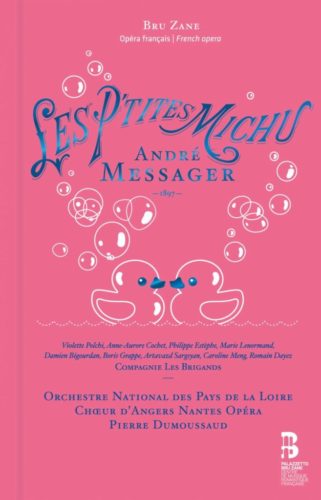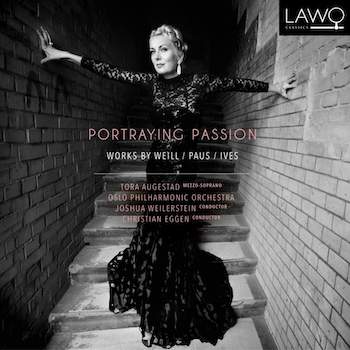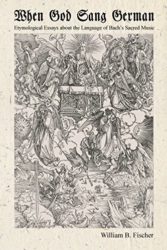Best Opera and Vocal (Recordings, Books, and a Performance), 2019
By Ralph P. Locke
This year has brought a bumper crop of wonderful recordings of unusual operas — and one unusual recording of a repertory staple: Gounod’s “Faust.” Also some books I’d like to mention, and a performance that I was really glad I attended.

We finally got a recording — a splendid one — of Donizetti’s L’ange de Nisida (Opera Rara 58), a work that never got performed during the composer’s lifetime, and that he plundered for sections to use in his (now relatively familiar) La favorite. See a fascinating three-minute trailer about the recording, and the scholarly effort that was needed to reconstruct this startlingly bold work. The performance, under Mark Elder, is magnificent, not least the singing of Joyce El-Khoury and David Junghoon Kim as the two lovers. The entire recording can be heard for free on YouTube (broken down into 56 segments). I reviewed it for ArtsFuse here.
Le tribut de Zamora, Gounod’s last opera (1881), likewise got its first recording, marvelously performed under Hervé Niquet (Bru Zane 1033). I reviewed it for Arts Fuse. This is one of 22 rarely performed (and often previously unrecorded) French operas that, over the past 10 years, have been released on CD by the Center for French Romantic Music, an organization whose offices are located in the Palazzetto Bru Zane (in Venice). Excerpts from Le tribut can be seen and heard in this video.
One of the most skillful women composers of the 19th century was Pauline Viardot, better known as a great operatic mezzo. Her Le dernier sorcier, a short opera with piano accompaniment, got released this year in a first-rate performance featuring Met superstars Jamie Barton and Eric Owens and other marvelous singers. The linking narration is read by Trudie Styler, wife of the British pop singer Sting (Bridge 9515—see trailer here). The libretto was written, in French, by the Russian novelist Ivan Turgenev, a close friend of Viardot and her husband Louis. The work is full of humor; it also offers pointed commentary on the devastation that humans (represented by a loutish wealthy sorcerer and his sidekick, an addled-brained giant) wreak on the natural environment (the fairies’ forest). The music is enchanting, appropriately enough for a fairy tale, and the performance is the stuff of dreams. I reviewed it here.
The oddest opera I heard all year, and in some ways the most fascinating, was Salieri’s Tarare (1787). Composed to a libretto by Beaumarchais (creator of the barber Figaro), it is a bold experiment in matching music to a dramatic text as directly as possible. There are no full-length arias, just short arioso statements that go through a character’s set of words a single time (often at a quick conversational pace) and then we’re on to the next character’s (sung) statement. In this respect, Tarare anticipates what Wagner would do 70 and more years later in the Ring Cycle and his other mature operas. The performance (Aparte 208) features some of the best of today’s young Francophone singers (e.g., Karine Deshayes) under the urgent leadership of early-music specialist Christophe Rousset (see video excerpts here). More on it in my review.
Olimpie, by Gaspare Spontini (another Italian in Paris, like Salieri and, later, Donizetti), was perhaps the most surprising of the batch. His La vestale leaves me unmoved. But the new recording of Olimpie (Bru Zane 1035) finally allowed me to see why Berlioz and Wagner both thought so highly of this now-largely-forgotten composer. The performance, under the direction of Jérémie Rhorer, helped put the work across, as I discuss in my review.
Two French comic operas grabbed my attention: the first being André Messager’s Les p’tites Michu (1897; Bru Zane 1054). Messager is largely forgotten today but knew how to translate dramatic action and contrasts of character into musical terms (see excerpts of the staged performance here). You have to follow carefully the spoken text that sets up each musical number. One stretch of spoken exchanges goes on for 10 hilarious minutes. Fortunately, the recording, like all those on the Bru Zane label, comes with a smallish book that contains enlightening scholarly essays and the libretto (in French and good English). I reviewed the recording in rather close detail for the scholarly journal Nineteenth-Century Music Review.
The other French comic opera that I grew to adore this year was Offenbach’s La Périchole (Bru Zane 1036, reviewed here). Three of the title character’s arias have been sung by numerous sopranos and mezzos, such as Régine Crespin. Some previous recordings of the opera have featured international superstars (e.g., Teresa Berganza). But here we have it (in a version that combines the strengths of its first and second versions) performed entirely by native Francophones, and, as in the Messager recording, the substantial spoken dialogue is delivered with much wit. The singing is consistently firm and nuanced (see excerpts from the production here) and will bear up to years of repeated listening.
And then, as I mentioned, there’s a standard opera, heard in a new way. Gounod’s Faust was first performed in 1859 in a version with spoken dialogue between the musical numbers. Some arias and larger ensembles were totally different from the ones that Gounod would compose when he, in subsequent years, reworked the piece into an all-sung work. The 1859 version has now been reconstructed, and we can hear it marvelously performed (the meltingly beautiful soprano is Véronique Gens; Bru Zane 1037). Excerpts can be seen and heard on this video. I review the recording here. Again, the accompanying book is immensely informative, helping us to understand the many differences between the standard version of Faust and this earlier but no less involving one.

The Bru Zane label has compiled some of the greatest hits (and some marvelous “sleepers”) from the dozens of recordings that its research center has helped produce over the past 10 years. This 10-CD set (Bru Zane ES 2001) devotes three discs to opera, one to the cantata, one to sacred music, one to mélodie (art song), and four to instrumental music. (See video trailer here.) I enjoyed hearing again some of my favorite tracks from various recordings, but I was also delighted to taste recordings that I did not know existed: new to me were, for example, two Offenbach numbers and some songs typical of the intimate numbers that in the 19th century might have been sung in a café-concert, the predecessor to the nightclub.
I should mention one newish opera that I was lucky to see in performance here last month: Daniel Catán’s Il postino. Originally produced at the Los Angeles Opera in 2010, this deeply involving work tells a story (freely imagined — and based on the 1994 film of the same title) about the Chilean poet Pablo Neruda and a young letter-carrier whom he befriends and encourages. Catán’s music is colorful, stirring, and often quite tuneful. The performance was by Virginia Opera, the only major traveling opera company in the US to perform in three different cities: Norfolk, Richmond, and (where I caught it) Fairfax. The singers were marvelous: steady and beautiful in tone, and alert to the implications of the words and action. The sets and stage direction (visible in this review) were totally in tune with the tale and its musical embodiment. Catán (1949-2011) was a Mexican composer, and he wrote the work to his own libretto, in Spanish. (The opera’s title is in Italian because the action unfolds on an island off the Italian coast.) The supertitles were a big help, but I often didn’t need them, so clear were the composer’s and the performers’ intentions. A DVD exists of the original production, featuring Plácido Domingo as the aging poet.
I close with three other items of interest to people who love vocal music. First, the world-premiere recording of a wonderful new song cycle for mezzo and orchestra by Marcus Paus (b. 1979), to texts by American humorist Dorothy Parker. It’s called Hate Songs, and is performed with zest by Tora Augestad and the Oslo Philharmonic. My review of it for the Kurt Weill Newsletter can be downloaded.
Second, a book that is immense in length but a delight to swim around in: Conrad L. Osborne’s 827-page Opera as Opera: The State of the Art. In a review of it, I expressed delight at its insightful comments on changes in vocal technique and in ways of staging operas. Osborne is perhaps America’s most distinguished opera critic and is also a professional vocal coach. He wrote the book over the course of many years, working his impressions of numerous productions at the Met and elsewhere into his argument. I recommend using his detailed index to follow his ideas and to locate his reactions (sometimes many pages long) to a given singer, recording, video, or live performance.
 Finally, a book that got published a year or two ago and seems not to have been much noticed yet (perhaps because it was self-published, though with much loving care): When God Sang German: Etymological Essays about the Language of Bach’s Sacred Music. William B. Fischer, a retired professor of German, is also a devoted choral singer. He conveys an amazing pedagogical presence on the page, pointing out religious and other cultural resonances in such crucial recurring terms and phrases in Bach’s works as “Geist” (spirit, mind, etc.), “Sünde” (sin), “Deutsch” (German), and “Mutterleib” (womb). The book’s main title, When God Sang German, plays off of the title of Timothy Michael Law’s widely praised 2013 book When God Spoke Greek (a book about the creation of the Septuagint—the Greek translation of the Hebrew Bible, which was made by some 70 scholars in the third to second centuries BCE).
Finally, a book that got published a year or two ago and seems not to have been much noticed yet (perhaps because it was self-published, though with much loving care): When God Sang German: Etymological Essays about the Language of Bach’s Sacred Music. William B. Fischer, a retired professor of German, is also a devoted choral singer. He conveys an amazing pedagogical presence on the page, pointing out religious and other cultural resonances in such crucial recurring terms and phrases in Bach’s works as “Geist” (spirit, mind, etc.), “Sünde” (sin), “Deutsch” (German), and “Mutterleib” (womb). The book’s main title, When God Sang German, plays off of the title of Timothy Michael Law’s widely praised 2013 book When God Spoke Greek (a book about the creation of the Septuagint—the Greek translation of the Hebrew Bible, which was made by some 70 scholars in the third to second centuries BCE).
Fischer’s book engages in “serious play”: with theology, with Bach, and with the German language and its confounded intricacies. It will augment the listening pleasure of any lover of the Bach Passions and church cantatas and also of anybody fascinated with matters linguistic.
Ralph P. Locke is emeritus professor of musicology at the University of Rochester’s Eastman School of Music. Six of his articles have won the ASCAP-Deems Taylor Award for excellence in writing about music. His most recent two books are Musical Exoticism: Images and Reflections and Music and the Exotic from the Renaissance to Mozart (both Cambridge University Press). Both are now available in paperback; the second, also as an e-book. Ralph Locke also contributes to American Record Guide and to the online arts-magazines New York Arts, Opera Today, and The Boston Musical Intelligencer. His articles have appeared in major scholarly journals, in Oxford Music Online (Grove Dictionary), and in the program books of major opera houses, e.g., Santa Fe (New Mexico), Wexford (Ireland), Glyndebourne, Covent Garden, and the Bavarian State Opera (Munich).
